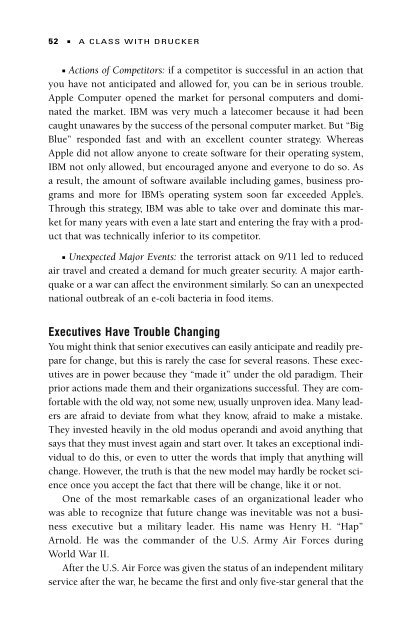A Class with Drucker - Headway | Work on yourself
A Class with Drucker - Headway | Work on yourself
A Class with Drucker - Headway | Work on yourself
Create successful ePaper yourself
Turn your PDF publications into a flip-book with our unique Google optimized e-Paper software.
52 ■ A CLASS WITH DRUCKER<br />
■ Acti<strong>on</strong>s of Competitors: if a competitor is successful in an acti<strong>on</strong> that<br />
you have not anticipated and allowed for, you can be in serious trouble.<br />
Apple Computer opened the market for pers<strong>on</strong>al computers and dominated<br />
the market. IBM was very much a latecomer because it had been<br />
caught unawares by the success of the pers<strong>on</strong>al computer market. But “Big<br />
Blue” resp<strong>on</strong>ded fast and <str<strong>on</strong>g>with</str<strong>on</strong>g> an excellent counter strategy. Whereas<br />
Apple did not allow any<strong>on</strong>e to create software for their operating system,<br />
IBM not <strong>on</strong>ly allowed, but encouraged any<strong>on</strong>e and every<strong>on</strong>e to do so. As<br />
a result, the amount of software available including games, business programs<br />
and more for IBM’s operating system so<strong>on</strong> far exceeded Apple’s.<br />
Through this strategy, IBM was able to take over and dominate this market<br />
for many years <str<strong>on</strong>g>with</str<strong>on</strong>g> even a late start and entering the fray <str<strong>on</strong>g>with</str<strong>on</strong>g> a product<br />
that was technically inferior to its competitor.<br />
■ Unexpected Major Events: the terrorist attack <strong>on</strong> 9/11 led to reduced<br />
air travel and created a demand for much greater security. A major earthquake<br />
or a war can affect the envir<strong>on</strong>ment similarly. So can an unexpected<br />
nati<strong>on</strong>al outbreak of an e-coli bacteria in food items.<br />
Executives Have Trouble Changing<br />
You might think that senior executives can easily anticipate and readily prepare<br />
for change, but this is rarely the case for several reas<strong>on</strong>s. These executives<br />
are in power because they “made it” under the old paradigm. Their<br />
prior acti<strong>on</strong>s made them and their organizati<strong>on</strong>s successful. They are comfortable<br />
<str<strong>on</strong>g>with</str<strong>on</strong>g> the old way, not some new, usually unproven idea. Many leaders<br />
are afraid to deviate from what they know, afraid to make a mistake.<br />
They invested heavily in the old modus operandi and avoid anything that<br />
says that they must invest again and start over. It takes an excepti<strong>on</strong>al individual<br />
to do this, or even to utter the words that imply that anything will<br />
change. However, the truth is that the new model may hardly be rocket science<br />
<strong>on</strong>ce you accept the fact that there will be change, like it or not.<br />
One of the most remarkable cases of an organizati<strong>on</strong>al leader who<br />
was able to recognize that future change was inevitable was not a business<br />
executive but a military leader. His name was Henry H. “Hap”<br />
Arnold. He was the commander of the U.S. Army Air Forces during<br />
World War II.<br />
After the U.S. Air Force was given the status of an independent military<br />
service after the war, he became the first and <strong>on</strong>ly five-star general that the


